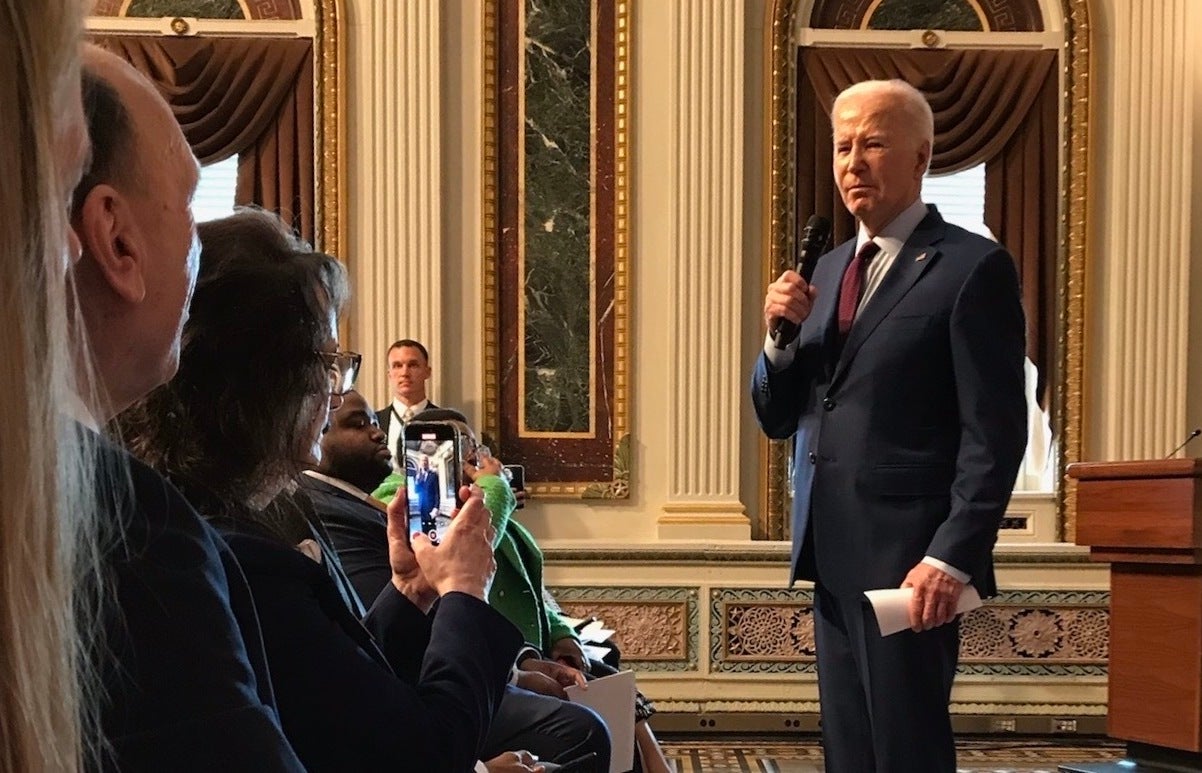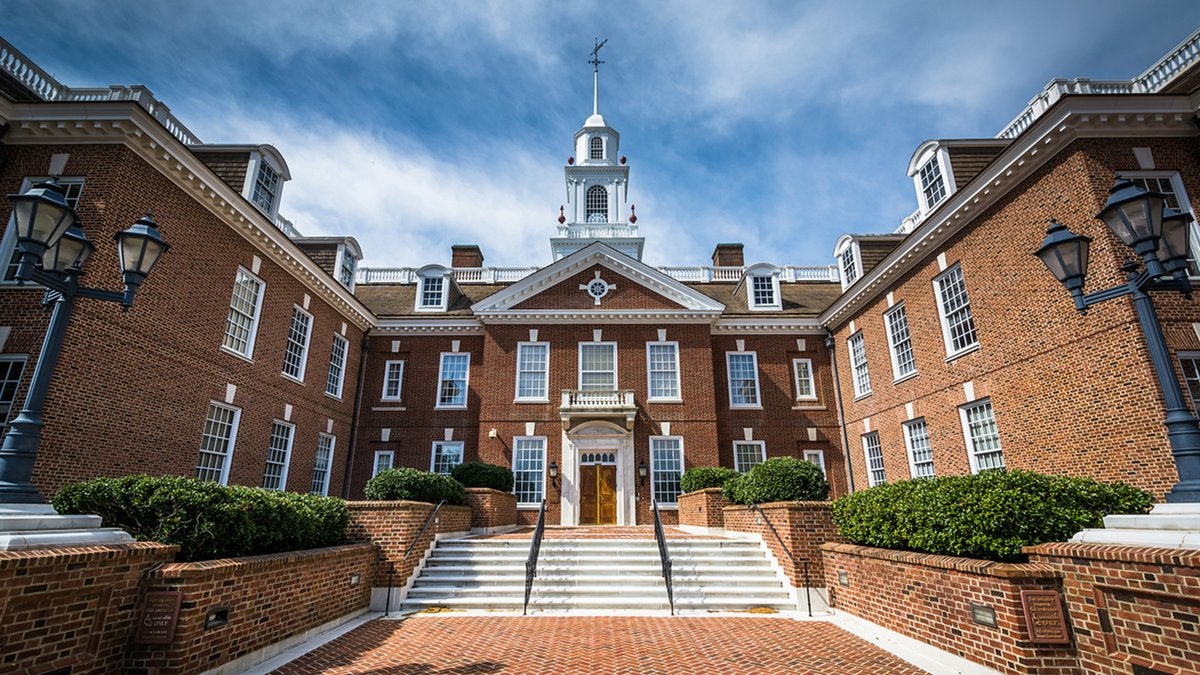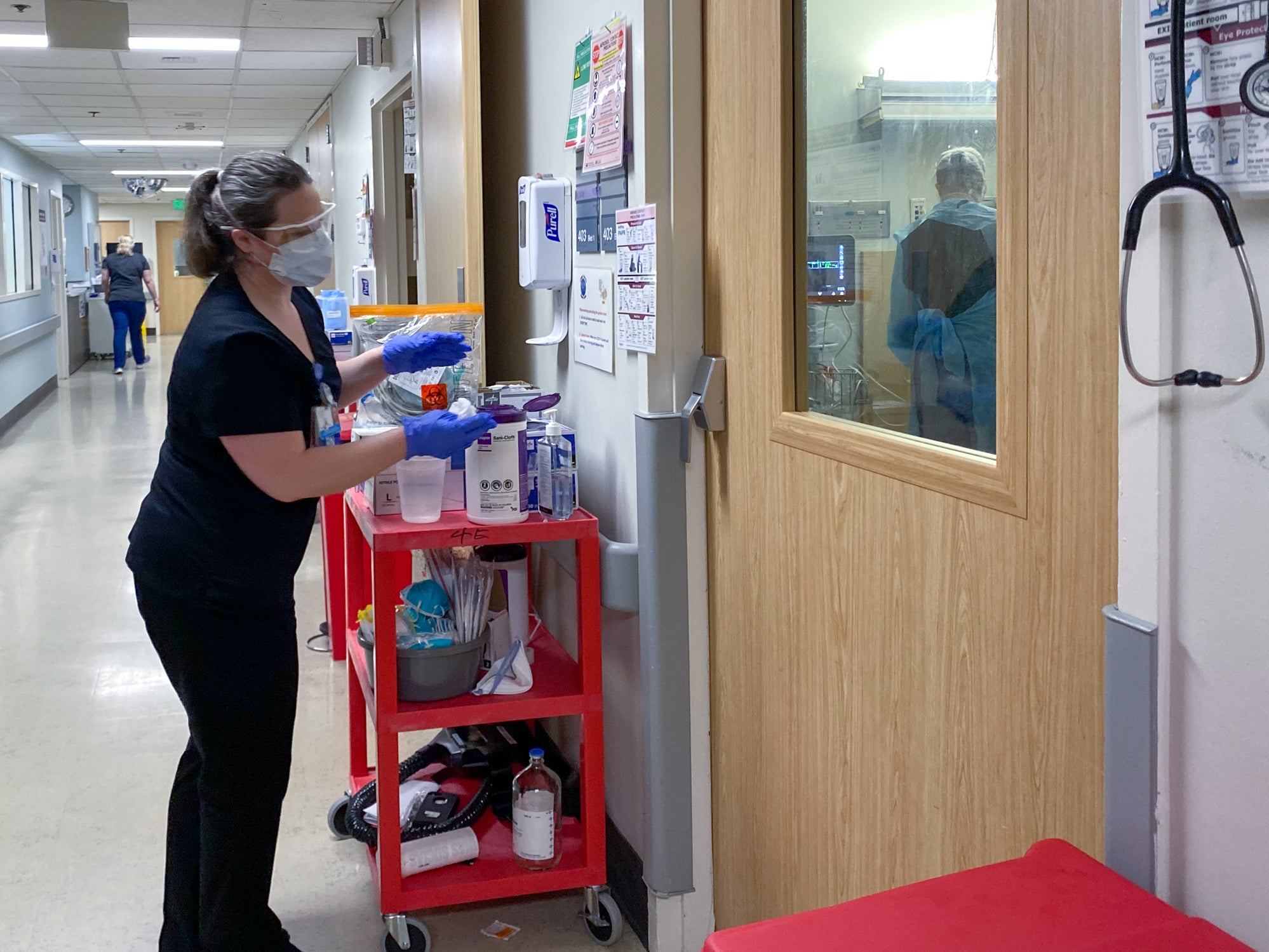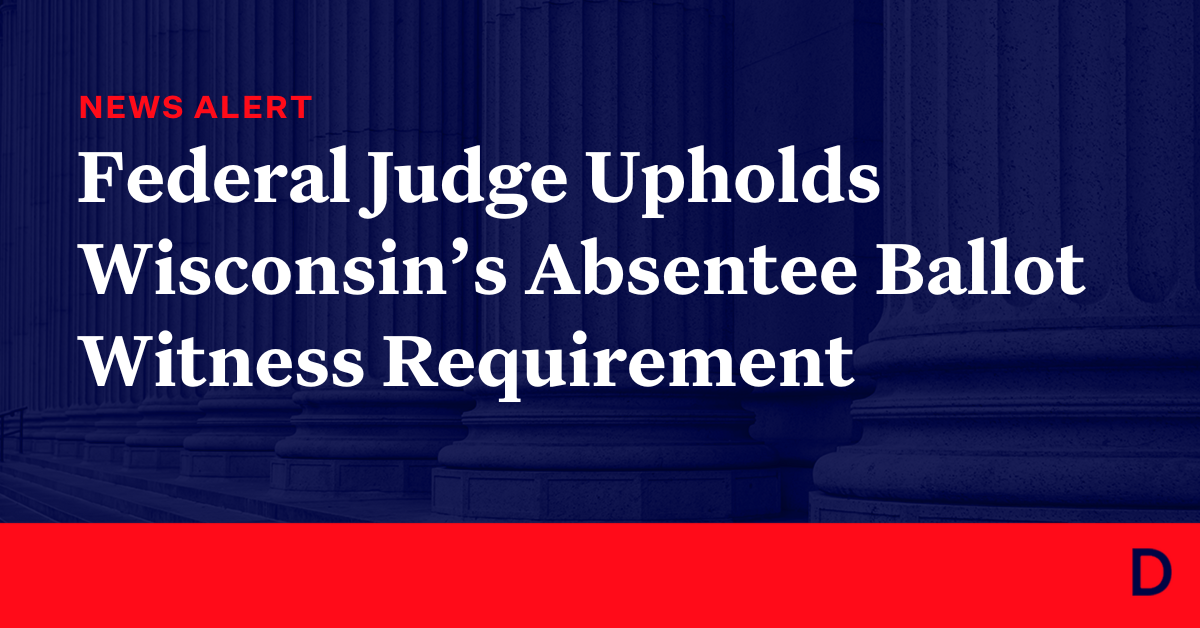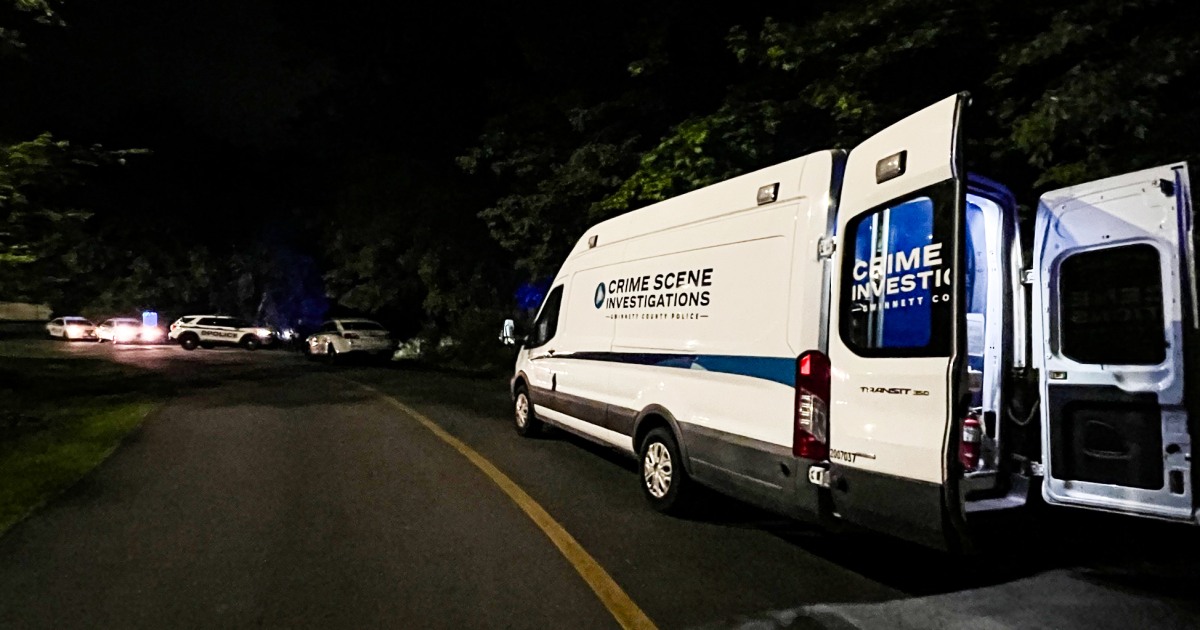Delaware
Delaware House OKs bill to review hospital budgets

From Philly and the Pa. suburbs to South Jersey and Delaware, what would you like WHYY News to cover? Let us know!
This story was supported by a statehouse coverage grant from the Corporation for Public Broadcasting.
Legislation creating a hospital cost review board passed the Delaware House Thursday after a long and contentious debate that frustrated members of both sides of the aisle.
Speaker Valerie Longhurst’s bill passed 21-16 on a near party-line vote, with three Democrats, Reps. Sean Lynn, Stell Parker Selby and Sean Matthews voting in opposition. After more than three hours of debate, Democrats took a short break, came back into session and then used a procedural maneuver to end debate and force a vote on the bill. Some lawmakers said they were disappointed with how the debate on the bill was handled.
“It’s an embarrassing day,” House Minority Leader Michael Ramone said. “It’s a sad day, and I’m very sad to be a part of this legislature.”
The measure aims to rein in increasing health care costs in the First State by requiring hospitals to submit their budgets to ensure they’re in compliance with government spending benchmarks. The hospital cost review board bill is based on a similar board Vermont created to curb health care costs.
Under Longhurst’s proposal, the board would review each hospital’s budget annually. If a hospital fails to meet spending benchmarks, it would be required to develop a performance improvement plan. Once a hospital meets spending targets for three consecutive years, the board would release it from the performance plan oversight. When a hospital successfully meets its budget goals for three consecutive years, it would no longer be required to participate in the budget approval process.
“This legislation is not about punishing hospitals, but rather ensuring our constituents are able to access quality and affordable health care and to put a system into place to slow down the skyrocketing costs that we have experienced in Delaware,” she said.
The board would consist of seven members, six of whom would be appointed by the governor and confirmed by the state Senate. The executive director of the Delaware Healthcare Association would be the seventh “non-voting” member.
Longhurst argued that the only year the benchmark had been met was in 2020 due to COVID, when fewer people were accessing regular medical care.
“Every other year, health care spending has far surpassed the benchmark we set for this date, including years with over 11% growth in health care costs,” she said.
2021 saw an 11% increase as more people resumed health care visits they had put off during the pandemic, according to the Delaware Department of Health and Social Services’ third annual benchmark trend report.
Gov. John Carney set a spending benchmark in 2018, which was an aspirational goal for annual per-capita-rate health care spending growth. The 3.8% benchmark took effect in 2019. It’s since fluctuated to various percentages below 4%.
Opponents of the legislation have said it substitutes political judgment for hospital experts’ expertise and doesn’t focus on cost drivers such as prescription drugs, workforce shortages, and insurance companies. Newark-based ChristianaCare, Dover-based Bayhealth and Lewes-based Beebe Health have recently spoken out in opposition to the board.

Delaware
Gubernatorial candidates weigh in on reforming education in Delaware

2024 Delaware State of the State: New school buildings, early education programs, mental wellness, and more
New school buildings, mental health programs, early education, new investments and more from the 2024 Delaware State of the State.
Changing Delaware’s education funding formula.
Investing in childcare and early childhood education.
Ensuring equitable resources across all schools and providing teacher support and professional development.
These were just some of the topics the five candidates for Delaware’s next governor tackled during an education forum hosted by the Vision Coalition of Delaware Wednesday evening at Polytech High School in Woodside.
PUBLIC POLICY FOCUS: From child poverty to education, here’s what experts say should shape public policy
Democratic candidates Lt. Gov. Bethany Hall-Long, New Castle County Executive Matt Meyer and former Department of Natural Resources and Environmental Control Secretary Collin O’Mara, along with Republican contenders Jerrold Price and state House Minority Leader Mike Ramone, who most recently filed his candidacy for governor on the Republican line May 6, were in attendance.
The candidates fielded questions from leadership of the Vision Coalition as well as students across the state of Delaware.
Here are five takeaways:
Fixing the funding formula
Most of the candidates Wednesday evening agreed the way Delaware funds its schools needs to change.
Delaware was sued in 2018 by Delawareans for Educational Opportunity and the NAACP over the First State being aware of deficiencies in resources provided to lower-income students, students with disabilities and multilingual learners.
In December, an independent assessment of Delaware’s education funding system recommended sizable changes, including shifting to a funding formula based on student needs, not resource-based units. In such a system, money would follow students with higher needs.
Hall-Long: “We’re going to have to move that funding formula forward for equity.”
Meyer: “We’re not measuring up today. If you go into schools in Wilmington and rural parts of the state with reading and math scores in the single digits. It starts with getting the funding formula right.”
O’Mara: “Look at the way Delaware reacted to desegregation and the lines that were drawn. We never increased funding and never changed the formula. We just have less and less funding for schools.”
Ramone: “Education funding needs to be modified. Education is supported very inconsistently. Delaware teachers should be at the top of the pyramid, not the bottom. Pay them what they are worth. Create an environment where we prioritize our children and the schools.”
Using funds from other sources
Candidates stressed that other avenues for funding for education and early childhood support must be explored.
The lawsuit over inequitable funding ultimately prompted a statewide reassessment of properties, which Meyer – who was part of the lawsuit as New Castle County executive – said helps school boards access up to 10% of new revenue every five years without going to referendum.
Meyer suggested making changes to the state tax code, which maxes out at a rate of 6.6% for everyone making $60,000 or more.
This makes Delaware one of the highest income tax states in the region for people making lower and middle class salaries. Maryland, New Jersey, Pennsylvania and even New York all have lower income tax rates for people who earn about $60,000 annually, according to the Tax Foundation data.
Meyer: “If a family makes $70,000 today, did you know they pay the same tax rate as someone making $70 million? It’s a moral imperative that we fix these things.”
O’Mara: “I do think the property tax assessment is going to be a piece of (funding sources). I also think we need to look at other funding sources, whether that be the tax code… also different revenues with excise taxes.”
PROPERTY TAX LAWSUIT: Wilmington asks to join lawsuit to force New Castle County property tax reassessment
Hall-Long: “Funding is absolutely paramount. I can tell you there are all kinds of things – sin tax funds (referencing future recreational marijuana sales as a potential revenue source).”
Ramone: “We have money in our government and we need to choose where the best investments are to get the biggest bang for that dollar.”
Price: “I agree with the assessment. Everyone is talking about spending millions of dollars. We need to go through our finances and see if that money is available. I can’t promise you something when the money is not there.”
Expanding childcare, early childhood education opportunities
Democratic gubernatorial candidates stressed the importance of childcare access and expanding early childhood education opportunities as between birth and the age of 5, “90% of a child’s brain is developed,” Hall-Long said.
Hall-Long: “Early education has to happen – we have to get there.”
Meyer: “We need heavy investment early.”
O’Mara: “Delaware is facing three crises: early childhood development, childcare and a lack of pre-K. Despite the investments, it’s still a fraction of what we need.”
Price: The Republican candidate pledged to help people if they seek help. “I can’t go into your house and tell you how to raise your children.”
ADDITIONAL FUNDING: Gov. Carney announces further investment for child care needs in Delaware
Ramone: “We’ve invested a ton of money in childcare and pre-K. Do we create an environment where we try to complement what we have in school systems with the private sector?”
Equity for children of all backgrounds, learning levels
Candidates stressed that fixing the funding formula is key to ensuring equitable investments for children from all socioeconomic and cultural backgrounds.
This was also a sticking point in the recommendations out of the statewide assessment on Delaware’s education funding system and the lawsuit brought against the state.
Hall-Long: “Equity runs through everything that we’ve done… It takes more than one initiative. It’s not just money. It’s leaning in and making Delaware the strongest place to be for our children.”
Meyer: “We need to make sure the teachers we recruit, not only where possible, speak multiple languages, but also have a culture of tolerance. Our schools ultimately are a reflection of who we are as a community.”
O’Mara: “They are staffing classes based on the bodies in the class rather than the needs in the classroom. We’re trying to have staffing levels that match the needs of the students.”
Price: “I think a lot of resources are already there, they just have to be used… We have to get rid of the disruptive children – not get rid of them, just help them. Get them counseling. There are only two genders. Men will not be playing women’s sports.”
Ramone: The House minority leader pointed to ASPIRA Charter School as an excellent education model for English language learners. “They took a community, and now the community has a bilingual dynamic to it. They are learning English fluently, and they’ve brought the parents in.”
Providing mental health support for students, educators
In recent years, Delaware has passed legislation and earmarked funding to expand mental health support for students.
But even those who were in office during those expansions said more needs to be done given the trauma children carry into the classroom – regardless of age.
Hall-Long: “We have invested the most ever to ensure elementary and middle schools have those supports. We’re continuing to work to ensure that resource in high schools. We have a long way to go and it’s only going to be done with everyone involved in the room here.”
Meyer: “Kids are coming to school with baggage that we cannot see. As county executive, we are the only local government in Delaware that approved wellness centers (at schools). We’re also going to do things to support teachers’ mental health (like reducing class sizes) to ensure teachers remain healthy.”
EXPANDING SUPPORT: Delaware lawmakers confront worsening mental health crisis for teens with these new bills
O’Mara: Applauded the steps the state has taken so far to provide mental health resources in schools. “We need to do it for middle and high schools. Children facing massive trauma – it doesn’t end in elementary schools, it follows all the way through.”
Price: “A lot of this mental health started because the family structure broke down. We’re going to provide counseling, it’s already there. You can’t force people to get help if they don’t want it.”
Ramone: The House representative shared a story about a childhood friend who spent time at MeadowWood Behavioral Health Hospital, and later lived in a group home. “She went there and they focused on her needs. That’s what our education needs to do for our children with the smallest cups.”
Got a tip? Contact Amanda Fries at afries@delawareonline.com. Follow her on X at @mandy_fries.
Delaware
A Delaware auditor was convicted of corruption. Now she’s running for state House
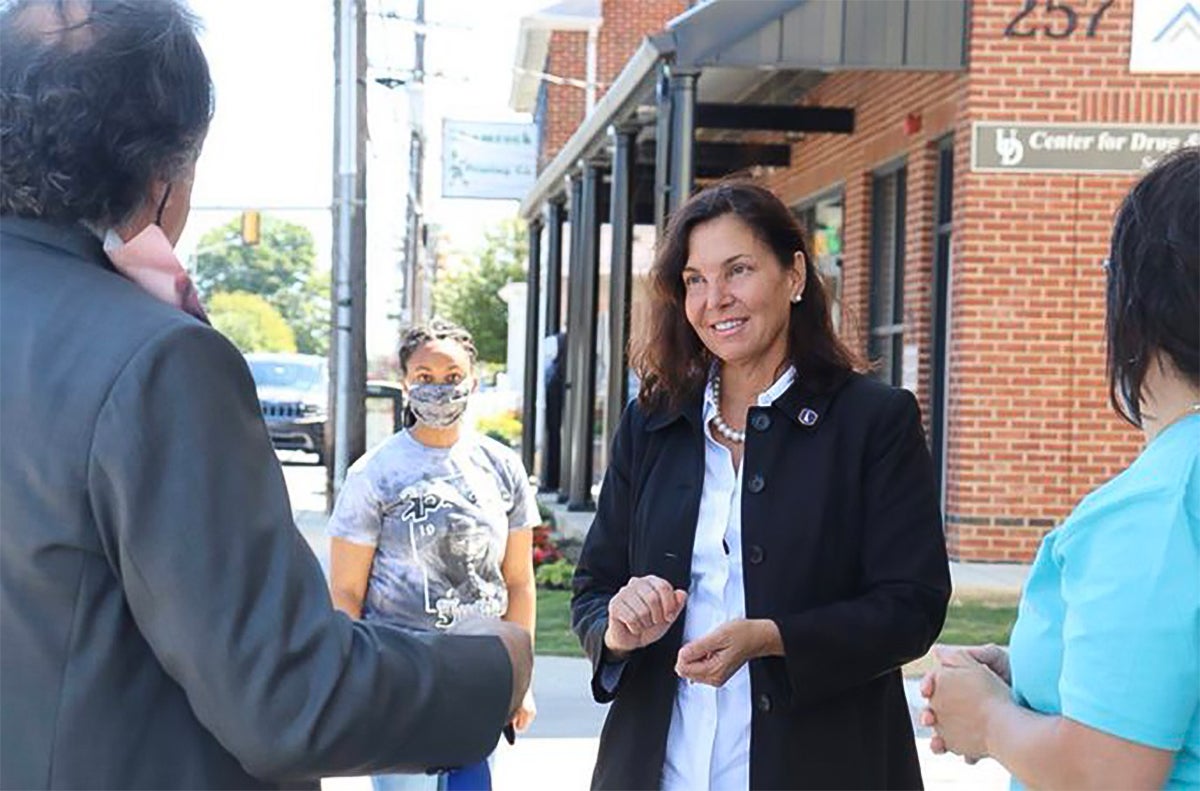
2 primary foes ‘surprised’ McGuiness is running for office
Both of McGuiness’ primary opponents suspect voters will be skeptical of a convicted politician who resigned in disgrace.
“I have to say I’m a little surprised that Kathy McGuiness decided to run,’’ Snyder-Hall said. “I mean, we’ll see in September what voters think, but I’m betting they want an ethical and effective leader who was well-respected in Dover.”
Rendon said the bottom line is that a candidate with a conviction related to her elected office is on the ballot.
“I’m not trying to go negative on anybody, but people are really surprised she’s running again,’’ Rendon said. “That’s the reaction I get, but I’m trying to keep the focus off of her and just talk about the kinds of things that the people want to have done for them in Dover.”
McGuiness announced her candidacy Saturday in Dewey Beach, with Schwartzkopf offering supportive remarks. In an interview this week, she told WHYY News she paid her $10,000 fine and performed 500 hours of community service at the Food Bank, a soup kitchen and other venues during her year on probation.
Echoing Schwartzkopf’s sentiment that her conviction was for a “low-level misdemeanor” for hiring her daughter, McGuiness said she’s moving forward.
“I believe I’m the best person for this position,’’ she said. “I’m ready to hit the ground running and help the people of this district,” which also includes Dewey Beach and increasingly populated inland areas.
“I believe they need a strong voice, someone that knows the area, knows the people, has seen the change, seen the growth. We’re going to have growth, but we must direct it, and it has to be responsible,” she said. “I believe we need someone who is there to help assist and do it in incremental phases in a positive manner.”
She’s asking voters not to hold her legal troubles against her at the ballot box.
“I would hope that people can look at my record of decades of accomplishments and see all the good things that I’ve been involved in and helped with throughout the years, and know that I have the drive and the energy to serve my community.”
Schwartzkopf, who has represented the district for 22 years and was speaker from 2013 until stepping down last year, said residents can feel comfortable contacting McGuiness on any matter.
“She was raised here. She knows the district. She knows the people in the district and she knows what the issues are in the district,’’ Schwartzkopf said. “She’s going to try to help you with whatever issue you have.”
Snyder-Hall and Rendon also said that if elected, residents can count on them to address their concerns.
Snyder-Hall, who ran unsuccessfully for state Senate in 2014 against incumbent Republican Ernie Lopez, said she’s looking forward to being the first woman to represent the Rehoboth area.
“We’re facing a series of crises, with a shortage of health care providers, workforce housing needs, public schools bursting at the seams and climate resiliency needed,” Snyder-Hall said. “And so I just felt like I was doing very good work with Common Cause for the democracy agenda, but I can do that work and also work on other pressing problems in the General Assembly.”
First-time candidate Rendon mentioned population growth and services for seniors as major challenges for coastal Delaware.
“Overdevelopment is a big issue. The land use is an issue. The traffic here is an issue, obviously, coupled with environmental concerns. We’re worried about climate change, the effect of the oceans rising, environmental degradation of our inland waterways,’’ Rendon said.
“And then of course with an aging population here in the area, we’re concerned about health care, having good medical facilities here.”
Delaware
11 Babies 'R' Us locations to open in Kohl's stores across Delaware Valley by 2025

The beloved baby gear and furniture shop Babies ‘R’ Us is making a return, and one could soon be in your area.
Kohl’s announced it will open a Babies ‘R’ Us inside nearly 200 of its stores later this year. The shops will range from 750 to 2500 square feet.
So far, several locations are coming to the Delaware Valley region.
Here’s a full list of stores coming to our area:
Delaware:
– Newark, New Castle County
– Kirkwood, New Castle County
– Middletown, New Castle County
New Jersey:
– Hamilton Township, Mercer County
– Mantua, Gloucester County
– Turnersville, Gloucester County
– Toms River, Ocean County
– Voorhees, Camden County
Pennsylvania:
– Havertown, Delaware County
– Springfield, Delaware County
– Bensalem, Bucks County
To find a full list of locations across the country, visit corporate.kohls.com.
Copyright © 2024 WPVI-TV. All Rights Reserved.
-

 World1 week ago
World1 week agoStrack-Zimmermann blasts von der Leyen's defence policy
-

 Politics1 week ago
Politics1 week agoThe White House has a new curator. Donna Hayashi Smith is the first Asian American to hold the post
-

 Politics1 week ago
Politics1 week agoStefanik hits special counsel Jack Smith with ethics complaint, accuses him of election meddling
-

 Politics1 week ago
Politics1 week agoDemocratic mayor joins Kentucky GOP lawmakers to celebrate state funding for Louisville
-

 World1 week ago
World1 week agoTurkish police arrest hundreds at Istanbul May Day protests
-

 News1 week ago
News1 week agoVideo: Police Arrest Columbia Protesters Occupying Hamilton Hall
-

 Politics1 week ago
Politics1 week agoNewsom, state officials silent on anti-Israel protests at UCLA
-

 News1 week ago
News1 week agoPolice enter UCLA anti-war encampment; Arizona repeals Civil War-era abortion ban
